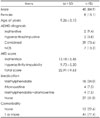1. American Psychiatric Association. Diagnostic and Statistical Manual of Mental Disorders (DSM-5®). 5th ed. Washington, DC: American Psychiatric Association;2013.
2. Polanczyk G, de Lima MS, Horta BL, Biederman J, Rohde LA. The worldwide prevalence of ADHD: a systematic review and metaregression analysis. Am J Psychiatry. 2007; 164:942–948.

3. Jensen PS, Hinshaw SP, Kraemer HC, Lenora N, Newcorn JH, Abikoff HB, et al. ADHD comorbidity findings from the MTA study: comparing comorbid subgroups. J Am Acad Child Adolesc Psychiatry. 2001; 40:147–158.

4. Webster-Stratton C, Hammond M. Maternal depression and its relationship to life stress, perceptions of child behavior problems, parenting behaviors, and child conduct problems. J Abnorm Child Psychol. 1988; 16:299–315.

5. Graziano PA, McNamara JP, Geffken GR, Reid A. Severity of children's ADHD symptoms and parenting stress: a multiple mediation model of self-regulation. J Abnorm Child Psychol. 2011; 39:1073–1083.

6. Mash EJ, Johnston C. Parental perceptions of child behavior problems, parenting self-esteem, and mothers' reported stress in younger and older hyperactive and normal children. J Consult Clin Psychol. 1983; 51:86–99.

7. Theule J, Wiener J, Tannock R, Jenkins JM. Parenting stress in families of children with ADHD: a meta-analysis. J Emot Behav Disord. 2013; 21:3–17.
8. McCormick LH. Depression in mothers of children with attention deficit hyperactivity disorder. Fam Med. 1995; 27:176–179.

9. Kashdan TB, Jacob RG, Pelham WE, Lang AR, Hoza B, Blumenthal JD, et al. Depression and anxiety in parents of children with ADHD and varying levels of oppositional defiant behaviors: modeling relationships with family functioning. J Clin Child Adolesc Psychol. 2004; 33:169–181.

10. Willcutt EG, Doyle AE, Nigg JT, Faraone SV, Pennington BF. Validity of the executive function theory of attention-deficit/hyperactivity disorder: a meta-analytic review. Biol Psychiatry. 2005; 57:1336–1346.

11. Barkley RA, Murphy KR. Impairment in occupational functioning and adult ADHD: the predictive utility of executive function (EF) ratings versus EF tests. Arch Clin Neuropsychol. 2010; 25:157–173.

12. Deater-Deckard K, Wang Z, Chen N, Bell MA. Maternal executive function, harsh parenting, and child conduct problems. J Child Psychol Psychiatry. 2012; 53:1084–1091.

13. Kaufman J, Birmaher B, Brent D, Rao U, Flynn C, Moreci P, et al. Schedule for Affective Disorders and Schizophrenia for School-Age Children-Present and Lifetime Version (K-SADS-PL): initial reliability and validity data. J Am Acad Child Adolesc Psychiatry. 1997; 36:980–988.

14. Kim YS, Cheon KA, Kim BN, Chang SA, Yoo HJ, Kim JW, et al. The reliability and validity of Kiddie-Schedule for Affective Disorders and Schizophrenia-Present and Lifetime version-Korean version (K-SADS-PL-K). Yonsei Med J. 2004; 45:81–89.

15. So YK, Noh JS, Kim YS, Ko SG, Koh YJ. The reliability and validity of Korean parent and teacher ADHD Rating Scale. J Korean Neuropsychiatr Assoc. 2002; 41:283–289.
16. Kim JH, Lee EH, Joung YS. The WHO Adult ADHD Self-Report Scale: reliability and validity of the Korean version. Psychiatry Investig. 2013; 10:41–46.

17. Lee H, Yang M, Lee EH, Joung YS, Hwang ST, Hong SH, et al. Reliability and validity of the Korean version of Barkley Deficits in Executive Functioning Scale (K-BDEFS). Korean J Clin Psychol. 2016; 35:519–539.

18. Lee EH, Lee SJ, Hwang ST, Hong SH, Kim JH. Reliability and validity of the Beck Depression Inventory-II among Korean adolescents. Psychiatry Investig. 2017; 14:30–36.

19. Lee HK, Lee EH, Hwang ST, Hong SH, Kim JH. Psychometric properties of the Beck Anxiety Inventory in the community-dwelling sample of Korean adults. Korean J Clin Psychol. 2016; 35:822–830.

20. Lee K, Chung KM, Park J, Kim H. Reliability and validity study for the Korean version of Parenting Stress Index Short Form (K-PSI-SF). Korean J Woman Psychol. 2008; 13:363–377.
21. Shin SJ, Chung MJ. Effects of parenting stress, social support and parenting efficacy on mothers' parenting behaviors [dissertation]. Seoul: Yonsei University;1997.
22. Shin YJ. A study on parenting in books for domestic life education of the Chosen dynasty period - Focusing on parental role of disciplining children. Fam Environ Res. 1995; 33:155–168.
23. Lovejoy MC, Graczyk PA, O'Hare E, Neuman G. Maternal depression and parenting behavior: a meta-analytic review. Clin Psychol Rev. 2000; 20:561–592.
24. Johnston C, Mash EJ. A measure of parenting satisfaction and efficacy. J Clin Child Psychol. 1989; 18:167–175.

25. Barkley RA. Hyperactive children: a handbook for diagnosis and treatment. New York, NY: Guilford Press;2006.
26. Abidin RR. Parenting Stress Index. Odessa, FL: Psychological Assessment Resources, Inc.;1995.
27. Johnston C, Mash EJ, Miller N, Ninowski JE. Parenting in adults with attention-deficit/hyperactivity disorder (ADHD). Clin Psychol Rev. 2012; 32:215–228.

29. Biederman J, Milberger S, Faraone SV, Kiely K, Guite J, Mick E, et al. Family-environment risk factors for attention-deficit hyperactivity disorder. A test of Rutter's indicators of adversity. Arch Gen Psychiatry. 1995; 52:464–470.

30. Kuperman S, Perry PJ, Gaffney GR, Lund BC, Bever-Stille KA, Arndt S, et al. Bupropion SR vs. methylphenidate vs. placebo for attention deficit hyperactivity disorder in adults. Ann Clin Psychiatry. 2001; 13:129–134.

31. Kessler RC, Adler L, Barkley R, Biederman J, Conners CK, Demler O, et al. The prevalence and correlates of adult ADHD in the United States: results from the National Comorbidity Survey Replication. Am J Psychiatry. 2006; 163:716–723.

32. Sonuga-Barke EJ, Daley D, Thompson M. Does maternal ADHD reduce the effectiveness of parent training for preschool children's ADHD? J Am Acad Child Adolesc Psychiatry. 2002; 41:696–702.









 PDF
PDF ePub
ePub Citation
Citation Print
Print




 XML Download
XML Download